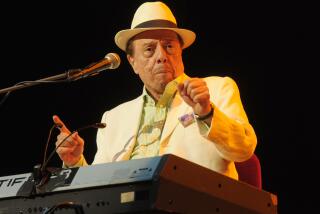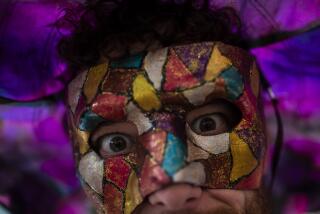Voyaging into parallel expressions of sound
It was carnival time over the weekend, and sequined and feathered dancers -- in sync with celebrations throughout Brazil -- were vibrating to the rhythms of the samba from the Queen Mary to the Palladium. Always a hedonist’s delight, it was a weekend loaded with sensory stimuli.
On Sunday afternoon, it also was a time to experience another aspect of Brazil’s rich culture through the music of the group Brasilian Voyage. Performing at the Rising Jazz Stars Foundation in Beverly Hills, the quartet -- guitarist Romero Lubambo, pianist Helio Alves, bassist Nilson Matta and drummer Chris Eddleton -- illuminated the romance between jazz and Brazilian music that has been finding new forms of expression for more than a half century.
Lubambo, the featured artist, has been a first-call guitarist since he moved to New York City in the mid-’80s, working first with Astrud Gilberto, then with a list of luminaries including Kathleen Battle, Michael Brecker, Al Jarreau and an empathetic pairing with singer Luciana Souza on two duo recordings.
Brasilian Voyage, in many respects, continues and expands on Lubambo’s work with Matta and drummer Duduka Da Fonseca in Trio Da Paz. Performing originals by Lubambo, Alves and Matta as well as Luiz Bonfa’s “Manha de Carnaval,” they played with stunning elan, improvising freely over of Brazilian rhythms.
Most fascinating, however, was the clear sense of this uniquely Brazilian take on jazz. Only loosely connected with the blues roots so important to American jazz, it is more indebted to the fast-paced, virtuosic techniques of choro, the early (and still very much alive) Brazilian music roughly parallel to New Orleans jazz. Swinging in their own fashion, generating quick-paced melodies and sudden rhythmic accents, the Brasilian Voyage players affirmed the capacity of jazz to become a global form of musical expression.
More to Read
The biggest entertainment stories
Get our big stories about Hollywood, film, television, music, arts, culture and more right in your inbox as soon as they publish.
You may occasionally receive promotional content from the Los Angeles Times.










